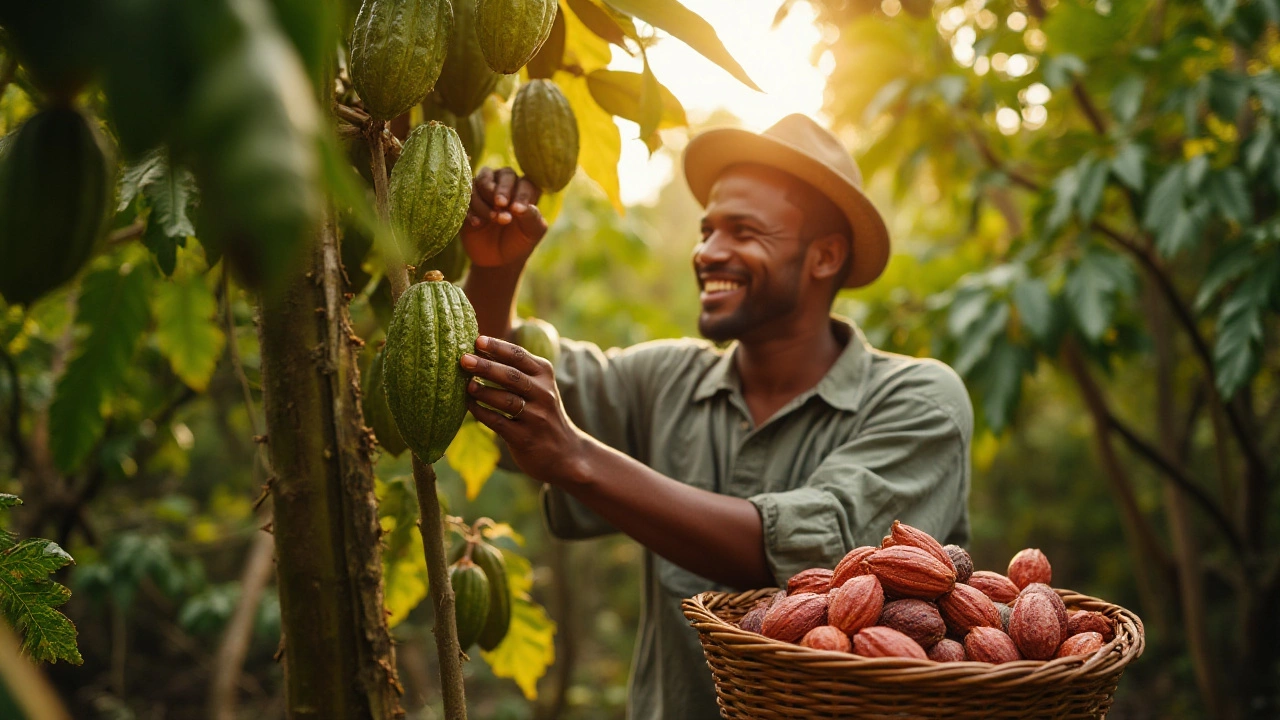
The world of chocolate is a tantalizing realm of rich flavors and decadent textures. For those choosing a vegan lifestyle, there is still a wide array of choices when it comes to satisfying that cocoa craving. In this article, we'll unwrap the mysteries of vegan chocolate, diving into its ingredients and exploring the brands that make veganism a delightful adventure in taste.
Identifying vegan chocolate can sometimes be a challenge, so knowing which ingredients align with plant-based diets is crucial. From simple dark chocolates to creative blends with fruits or nuts, the variety is vast and full of surprises. Let's delve into a world where indulgence meets ethical choices, promising treats that are as kind as they are delicious.
- Understanding Vegan Chocolate
- Ingredients to Look For and Avoid
- Popular Vegan Chocolate Brands
- Vegan Chocolate Recipes and Ideas
- The Ethics of Chocolate Production
- Tips for Shopping Vegan Chocolate
Understanding Vegan Chocolate
When we talk about vegan chocolate, we're diving into a delicious realm where traditional boundaries take a back seat to innovation and ethics. Typically, chocolate is made from cacao beans, sugar, and milk. The milk component is where standard chocolates depart from the vegan path. By opting for plant-based alternatives such as almond milk, oat milk, or coconut milk, manufacturers craft indulgent, creamy blends that remain free from animal products. This transition not only caters to those avoiding animal-derived ingredients but also introduces a delightful range of flavors distinctive to each plant milk.
Another key aspect to grasp is the essential role of cacao content in determining whether chocolate aligns with vegan principles. Dark chocolates with high cacao percentages, usually above 70%, tend to be naturally vegan as they often skip the milk ingredient altogether. However, vigilance is crucial. Some dark chocolates might include milk solids or butterfat as part of their blend, which necessitates careful label reading. Indeed, more brands are acknowledging the demand for ethical sweets, resulting in more transparent labeling and varied vegan offerings in the market.
Identifying Vegan Ingredients
A quick glance at labels can help you decipher which chocolates fit the bill. When boxes boast terms like “non-dairy” or “vegan”, they typically steer clear of milk and cream, although it never hurts to double-check. Another ingredient to watch out for is lecithin, often used as an emulsifier. It can come from soy or sunflower seeds, both plant-based, making them vegan-friendly. However, lecithin derived from eggs is not. Sweeteners, too, play a crucial role; organic or cane sugars may be filtered through bone char in their refinement process unless labeled otherwise. It’s these hidden nuances that make keen attention to detail imperative for those embracing a vegan lifestyle.
According to Dr. Lisa Mosconi, a well-respected neuroscientist, "Chocolates with a higher percentage of cacao are not only vegan but also known to enhance brain function. They hold a powerhouse of antioxidants beneficial for cognitive health," she explains, highlighting the added perks of choosing dark vegan chocolates.
With an open mind, embarking on a journey to discover vegan chocolate can become a culinary adventure. Each option unfolds as a unique interplay of cacao richness and the subtle notes carried by the chosen plant milk or sweetener. It's evident that as more people opt for ethical eating, the sweet world of chocolate is responding with vibrant creativity. And while this choice stems from a place of compassion, it doesn't skimp on sensational taste experiences.
Ingredients to Look For and Avoid
When it comes to selecting the perfect vegan chocolate, understanding ingredients is crucial. The journey of finding that perfect bite starts with flipping those chocolate bars around and scanning the back. First off, cocoa is your go-to star ingredient. Look for terms like cocoa mass, cocoa butter, and even cocoa solids. These are plant-based, deriving directly from the cacao bean, which is both naturally rich and vegan. So, they are your ticket to a genuinely plant-based treat.
However, there's a twist in the narrative. Cocoa butter, despite its misleading name, is wholly plant-derived. It lacks any dairy, which might come as a surprise to those new to vegan chocolates. Now, speaking of surprises, you'll want to be on the lookout for things like milk solids, whey, or casein, which are decidedly non-vegan. While dark chocolates offer a safe harbor more often than not, traces of milk can sneak into them thanks to shared manufacturing spaces.
Sweetening the Deal
Sweeteners are another crucial factor when picking out a delectable vegan dessert. Traditionally, white sugar can be a contentious point. It’s often processed using bone char, which isn't vegan. So, opt for chocolates sweetened with organic sugar, which sidesteps this process, or look for alternatives like coconut sugar, agave syrup, or even natural fruit juices. Another intriguing find is the use of monk fruit or stevia, providing sweetness without bringing glycemic concerns to the table.But wait, there are more goodies to scout! Ingredients like almonds, hazelnuts, and other nuts offer a delightful crunch, enhancing vegan chocolates. Then there are fruits—dried strawberries, blueberries, or even freeze-dried raspberries—that lend a zestful twist to your chocolate bars. An unexpected bonus is the hint of spices like cinnamon or chili peppers, punching up the flavor profile immensely.
Avoiding the Unwanted
Now, an important piece of advice: Steer clear of lecithin that derives from egg yolks. Although sunflower and soy lecithin are vegan-friendly emulsifiers, sometimes egg versions can be used. Also, artificial flavorings can sometimes have origins that aren't plant-based, so aim for chocolates that tout natural flavors. Watch out as well for hidden gelatin or non-vegan E-numbers, which might mask animal-derived substances.According to PETA, "Many candies and chocolates contain animal-derived ingredients, even those we wouldn't suspect." Therefore, thorough label reading is your best friend when navigating these sweet yet tricky waters.
| Key Ingredient | Vegan Status |
|---|---|
| Cocoa Butter | Vegan |
| Milk Solids | Non-Vegan |
| Organic Sugar | Vegan |
| Lecithin (Sunflower/Soy) | Vegan |

Popular Vegan Chocolate Brands
Finding a great vegan chocolate can feel like discovering buried treasure, especially when the market offers so many delicious options. Over the years, several brands have emerged as champions of vegan chocolate, each bringing their own unique take on this plant-based delight. One of the most prominent names in the industry is "Endangered Species Chocolate." Known for their commitment to sustainability and ethical sourcing, they offer a range of dark chocolate bars that are all certified vegan. Their bars, like the Dark Chocolate Almond & Sea Salt, offer a delightful combination of deep flavors and crunch, making them a hit among chocolate lovers.
Another exceptional brand is "TCHO," which prides itself on crafting chocolates that are not only vegan but also organic and fair trade. TCHO's vegan chocolates, especially their PureNotes Dark Chocolate, provide a rich, intense flavor that resonates with purists. These chocolates, often bought by those who appreciate their bean-to-bar philosophy, are great examples of how vegan options don't compromise on taste or ethics. Then there's "Green & Black's," a brand that introduced its first vegan dark chocolate line years ago and quickly became a household favorite. With a variety of options, including their popular 70% Dark Chocolate, Green & Black’s has combined organic ingredients with tantalizing flavor profiles.
The story of "Theo Chocolate" is worth noting too. This Seattle-based company combines luxury with conscientious choices, ensuring all their products are vegan, fair trade, and organic. Their Salted Almond 70% Dark Chocolate Bar is a testament to their dedication, offering notes of rich cocoa with a satisfying salty bite. Not far behind is "Alter Eco," which not only produces phenomenal vegan chocolate but also aims for the highest sustainability standards, including the use of compostable wrappers. Their Dark Quinoa Organic Chocolate bar stands out with its crunchy texture and deep cacao tones.
There's a growing trend where traditional chocolate brands are expanding into the vegan desserts space. "Lindt" recently introduced its vegan chocolate line, offering fans the same classic smoothness they've come to love but in a dairy-free version. Lindt's move highlights a shift in consumer demand towards more compassionate consumption without losing an ounce of luxury. This effort by big brands signals the burgeoning popularity of vegan cuisine.
"The demand for vegan products is not just a trend, it's a reflection of a larger desire for ethical choices in our consumption," says a spokesperson from Vegan Society.
Statistics are quite telling when assessing the demand for vegan alternatives. A recent survey indicated a 25% increase in the demand for plant-based chocolates globally over the past five years alone, illuminating the shift in consumer choices and values.
Vegan Chocolate Recipes and Ideas
Diving into the realm of vegan chocolate recipes opens up a world where flavor and creativity collide. Imagine the delight of biting into a rich, homemade chocolate truffle, each nibble bursting with the sumptuous notes of cocoa, all without a trace of dairy. When crafting these indulgences, simple ingredients transform into extraordinary desserts that please both vegans and non-vegans alike.
One beloved recipe is the classic vegan chocolate cake. Creating such a moist and decadent delight involves swapping traditional dairy components for plant-based alternatives. Use almond milk or coconut milk as a silky base and replace butter with applesauce or vegan margarine to achieve an unforgettable melt-in-your-mouth texture. To uplift the flavor, consider adding a spoonful of espresso powder to enhance the depth of the chocolate.
For those who fancy something a bit more adventurous, vegan chocolate mousse offers a silky and airy dessert option. You can achieve this by blending silken tofu with melted dark chocolate and a hint of vanilla extract. The secret lies in the tofu, which emulates the creaminess of traditional mousse without the use of eggs or cream. Serve in delicate cups with a sprinkle of fresh berries for a pop of color and flavor. Plant-based treats have never been more tempting!
"Creating vegan confections is about embracing creativity and embracing the delicious possibilities the plant kingdom offers," says vegan chef, Aine Carlin, whose cookbook has inspired many to explore plant-based dessert options.
Imagine whipping up a batch of chewy vegan chocolate chip cookies. With simple substitutes like aquafaba—the viscous liquid from a can of chickpeas—taking the place of eggs, and coconut oil replacing butter, these cookies pack a genuine chocolatey punch. They offer a warm, gooey center that holds up well, making them perfect for dunking in a glass of almond milk.
For something quick yet satisfying, consider vegan chocolate bark. Simply melt a high-quality vegan chocolate bar and spread it thinly over a baking sheet. While still warm, sprinkle your favorite toppings—think toasted nuts, dried fruits, or a dusting of shredded coconut. Once set, break into pieces and enjoy as a snack that combines both health and indulgence.
From cakes and cookies to innovative vegan twists on classic recipes, the options for plant-based chocolate desserts are endless. One of the biggest joys is the flexibility these recipes offer, allowing you to adjust sweetness, textures, and flavors to suit your own tastes. Whether you're an experienced baker or a novice, the journey to create vegan desserts is one filled with delight and discovery. The key is to keep experimenting and let your taste buds lead the way.

The Ethics of Chocolate Production
The journey of chocolate from bean to bar is one that takes us across continents and cultures. Yet, behind its delicious allure lies a landscape often clouded with real concerns about ethics and sustainability. For the conscientious consumer, understanding these issues is pivotal when choosing vegan chocolate that aligns with their values. The challenges are many—ranging from the exploitation of labor to the environmental impact of farming practices. These intricacies mean that the bar of chocolate you enjoy can sometimes carry a heavy ethical toll.
One of the pressing issues in chocolate production is the labor conditions on cocoa farms, especially in West Africa, which supplies over 70% of the world's cocoa. Reports have highlighted cases of child labor and unfair wages, making it crucial for consumers to seek chocolate sourced from fair-trade farms. These farms ensure ethical labor practices, offering workers fair compensation and better working conditions. This choice is important for those looking to enforce positive change with their purchase decisions. By opting for fair-trade certified vegan chocolate, buyers contribute to a more equitable chocolate industry.
"Supporting fair-trade chocolate means supporting farmers who uphold human rights and sustainable practices," states an advocate for ethical shopping.
Environmental sustainability is another key concern in chocolate production. Cocoa farming can lead to deforestation and loss of biodiversity, particularly when producers look to clear land for plantations. Some brands are committed to reversing these effects by employing sustainability programs that focus on agroforestry and habitat conservation. These initiatives not only protect the environment but also enhance chocolate quality by maintaining a healthy ecosystem. By choosing chocolate brands that prioritize environmental ethics, consumers can help conserve the natural world while still enjoying delicious vegan desserts.
Transparency in the supply chain is vital for ethical chocolate production. Several companies now provide traceability from bean to bar, allowing consumers to see exactly where their chocolate comes from and what practices were employed in its creation. This transparency can empower chocolate lovers to make informed choices that align with their values. Also, many artisanal chocolate producers are taking the ethical lead, often working directly with farmers to ensure ethical practices and fair pricing. By educating themselves on such practices, consumers can enjoy their chocolate with a clear conscience, knowing their decisions support sustainable and ethical farming.
Tips for Shopping Vegan Chocolate
Shopping for vegan chocolate can be a delightful experience, filled with variety and options that meet dietary preferences without sacrificing taste. However, the process might seem daunting with all the labels and ingredients to decode. One essential tip is to carefully read the ingredient list on the packaging. Since some chocolates labeled as "dark" may contain milk derivatives like milk powder or whey, it's important to verify the contents. A simple rule of thumb is to look for ingredients that include cocoa mass, cocoa butter, and sugar—these are typically safe bets.
Another good practice is to familiarize yourself with common terms used in vegan desserts. Look out for unfamiliar words or additives, like casein or lactose, which are dairy-based. Sugar can sometimes be a tricky ingredient due to its refining process, which occasionally involves bone char. In these cases, it's best to look for chocolates labeled as "organic" or "unrefined," as they are more likely to have a vegan-friendly processing background. Remember, vegan chocolate doesn't necessarily mean bland or basic; some contain exciting combinations of ingredients like sea salt, nuts, or exotic fruits for that extra flare!
Not all manufacturers adopt ethical production practices, so another key tip is to check for certifications on fair trade or Rainforest Alliance. These certifications ensure that the brand supports sustainable practices, benefiting both the environment and the farmers. This aspect of shopping for vegan chocolate encourages conscious consumerism, aligning you with your ethical beliefs. If you want to dive deeper into fair practices, consider looking for Single Origin chocolates, which further promote ethical sourcing and transparency.
When you're shopping for vegan chocolate, exploring smaller brands or local artisans could be rewarding. They often offer unique handmade products, providing assurances of no cross-contamination with animal products. While larger brands are gradually incorporating vegan options, small-scale operations bring distinctive textures and flavors that mass-produced chocolates might lack. As a fun fact, did you know that a significant percentage of artisan chocolatiers in Europe are transitioning to vegan options to meet growing demand?
"The future of chocolate is deliciously plant-based," said a spokesperson from the Vegan Society, highlighting the shift in chocolate production towards sustainable and ethical consumption.
Lastly, consider online resources or vegan communities, which can offer real-time reviews and recommendations for various vegan-friendly chocolate brands available in your area. Such platforms can provide valuable insights, from taste reviews to ingredient verifications. Joining these communities not only helps with shopping but also connects you with like-minded individuals passionate about plant-based living. Armed with these tips, your next shopping trip for vegan chocolate promises to be an adventure, offering a rewarding blend of conscious choices and tantalizing tastes.




